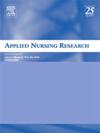The association between health literacy and readiness for hospital discharge among family caregivers of acute myocardial infarction patients
IF 2.7
4区 医学
Q1 NURSING
引用次数: 0
Abstract
Background
Family caregivers play a pivotal role in post-discharge care, yet their ability to manage this responsibility is influenced by their level of health literacy. However, limited research has examined the relationship between health literacy and family caregivers' preparedness for discharge in the context of acute myocardial infarction.
Aim
This study aimed to explore the association between health literacy and readiness for hospital discharge among family caregivers of acute myocardial infarction patients.
Methods
A cross-sectional design was employed, with 123 family caregivers of acute myocardial infarction patients recruited from three hospitals in Jordan. Data were collected using the Health Literacy Questionnaire (HLQ) and the Readiness for Hospital Discharge Scale-Family Caregiver Form (FamRHDS). Bivariate correlations and multiple linear regression were used to perform data analysis.
Results
Bivariate correlations analysis revealed significant positive associations between all nine health literacy domains and readiness for hospital discharge. Multiple linear regression indicated that three HLQ scales significantly predicted caregivers' readiness for hospital discharge, F (4, 122) = 32.02, p < .001, R2 = 0.52, explaining 50 % of the variance.
Conclusion
Health literacy significantly impacts family caregivers' readiness for hospital discharge, particularly in the domains of social support, appraisal, and understanding of health information. Healthcare providers should incorporate health literacy assessments and interventions into discharge planning for acute myocardial infarction patients and their family caregivers. Tailoring education to caregivers' health literacy levels can improve post-discharge care, patient outcomes, and the overall quality of the care transition.
急性心肌梗死患者家庭护理人员健康素养与出院准备之间的关系
家庭照顾者在出院后护理中发挥着关键作用,但他们履行这一责任的能力受到其健康素养水平的影响。然而,有限的研究已经检查了健康素养和家庭照顾者的出院准备在急性心肌梗死的背景下的关系。目的探讨急性心肌梗死患者家庭护理人员健康素养与出院意愿的关系。方法采用横断面设计,从约旦三家医院招募123名急性心肌梗死患者的家庭护理人员。使用健康素养问卷(HLQ)和出院准备程度量表-家庭照顾者表格(FamRHDS)收集数据。采用双变量相关和多元线性回归进行数据分析。结果双变量相关分析显示,所有九个健康素养领域与出院准备之间存在显著正相关。多元线性回归表明,三个HLQ量表对护理人员出院准备程度有显著预测作用,F (4,122) = 32.02, p <;.001, R2 = 0.52,解释了50%的方差。结论健康素养显著影响家庭照顾者的出院准备,特别是在社会支持、健康信息评价和理解方面。医疗保健提供者应将健康素养评估和干预措施纳入急性心肌梗死患者及其家庭护理人员的出院计划。根据护理人员的健康素养水平定制教育可以改善出院后护理、患者预后和护理过渡的整体质量。
本文章由计算机程序翻译,如有差异,请以英文原文为准。
求助全文
约1分钟内获得全文
求助全文
来源期刊

Applied Nursing Research
医学-护理
CiteScore
4.50
自引率
0.00%
发文量
65
审稿时长
70 days
期刊介绍:
Applied Nursing Research presents original, peer-reviewed research findings clearly and directly for clinical applications in all nursing specialties. Regular features include "Ask the Experts," research briefs, clinical methods, book reviews, news and announcements, and an editorial section. Applied Nursing Research covers such areas as pain management, patient education, discharge planning, nursing diagnosis, job stress in nursing, nursing influence on length of hospital stay, and nurse/physician collaboration.
 求助内容:
求助内容: 应助结果提醒方式:
应助结果提醒方式:


